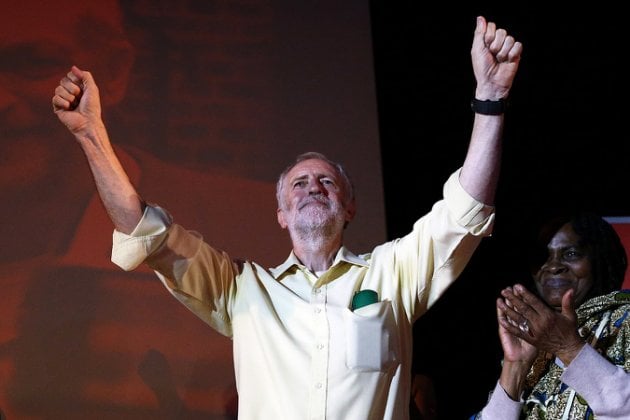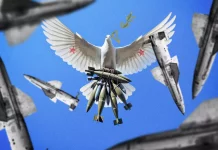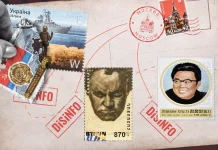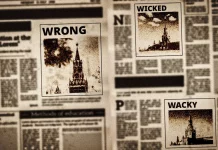
As Jeremy Corbyn’s lead over his rivals continues to grow in the Labour leadership contest, views he’s expressed once of interest chiefly to the party’s veteran socialist fringe are being exposed to increased scrutiny.
In an article for the Stop War Coalition coalition in March 2014 Corbyn opposes providing Ukraine with military support in the wake of the Maidan revolution, and echoes Russian claims that it was Nato scheming that lay at the heart of the crisis.
He argues that Ukraine has been “put under enormous pressure to come into the EU and Nato military orbit” and condemns EU leaders for failing to mention “far-right and racist involvement in the [Maidan] uprising.”
“Nato has sought to expand since the end of the Cold War. It has increased its military capability and expenditure. It operates way beyond its original 1948 area and its attempt to encircle Russia is one of the big threats of our time,” Corbyn writes.
To any viewers of Kremlin-owned news and propaganda outlet Russia Today (RT) these views will be familiar. From its outset the Ukrainian revolution has been portrayed on RT as a Nato-backed Neo-fascist coup, and false reports have been broadcast alleging atrocities committed by Ukrainian forces, with one uncorroborated report even claiming that Ukrainian forces crucified a three-year-old boy.
Corbyn has appeared as a guest on RT, and in a tweet urged followers to watch the station, arguing it provides a more “objective” coverage of world affairs than Western media.
In an interview with RT yesterday (August 11), Corbyn seemed to call for closer ties with Russia. “What is security? Is security the ability to bomb, maim, kill, destroy, or is security the ability to get on with other people and have some kind of respectful existence with them?” he said.
Critics argue that in the hands of Corbyn, the Labour party would be led by one of Russia’s “useful idiots”, a term ascribed to Lenin to describe idealistic Western supporters of the Soviet Union who were willing to turn a blind eye to its atrocities and failings.
In the Sunday Times, historian Anne Applebaum describes Corbyn as the latest “in a long line of useful idiots”.
“Corbyn is also one of many on the European far-left as well as the far-right who appears to have swallowed wholesale Russia’s lie that war in Ukraine has been created by Nato, rather than by the ‘separatists’ who have invaded eastern Ukraine and are paid, trained and organised by Russia itself,” she adds.
Writing for IBTimes UK, James Bloodworth, co- founder of the Left Foot Forward, argues that Corbyn is “remarkably good at proffering apologetics for dictatorship and tyranny” including “Russian gay-basher Vladimir Putin”.

“From the Kremlin’s point of view Corbyn would be the ideal person to win the campaign.”
Corbyn is one of a number of figures on the European far-left to have spoken in support of Putin’s Russia.
Greece’s ruling party anti-austerity party Syriza has formed close ties with Putin’s Kremlin, Spain’s populist left-wing coalition Podemos has accused the West of double standards in its dealings with Russia, while representative’s from Germany’s Die Linke visited Crimea during the independence referendum in 2014 widely decried as illegal in the West.
Figures from the UK hard-left have also declared support for Russia following Maidan, including former Respect MP George Galloway (who declared that he would rejoin Labour if Corbyn was elected leader) who used his RT show to decry the West for instigating the conflict in Ukraine.
For the Kremlin, argues Andrew Foxall of the right-wing Henry Jackson society think tank, such alliances serve a clear purpose.
“Both seek the renationalisation of Europe and the end of the European Union, which the left-wing parties see as a threat to national sovereignty and Russia sees as a threat to itself. Both the Kremlin and the left sees the West as decadent and its values as bankrupt. Both the far-left and Kremlin believe that Nato advances into eastern Europe have contributed to the Ukraine crisis,” he said.
Though Corbyn remains pro-Europe, unlike many of his hard-left counterparts, older loyalties draw him to the Russian position.
“There is a strain of left-wing thought committed to challenging or questioning US imperialism. [They ask] what is it good for? What has it achieved?” said Foxall. “That is now overlapping with an argument used in pro-Russian media. Russia is not saying it is any better but that the West is as bad as they are. They are almost trying to bring it down to the lowest common denominator.”
“From the Kremlin’s point of view Corbyn would be the ideal person to win the campaign, because so many of his ideals overlap with what the Kremlin is also pushing,” he said.
For supporters though, Corbyn’s stanch opposition to Western military interventions abroad is a much needed antidote to the Tony Blair years, which saw UK armed forces launch unpopular military operations in Afghanistan and Iraq as part of George W Bush’s widely criticised War on Terror. Critics also point to the lawlessness into which Libya descended after the Western backed campaign to oust dictator Muammar Gaddafi as further evidence of the catastrophic failings of Western military action abroad.
“Our position is just like with the Iraq war and with Afghanistan. Britain should not get involved with military operations abroad. We are against aggressive military action so are against military action in Ukraine,” explained Chris Nineham, national officer of the Stop the War Coalition, where Corbyn is a colleague on the national council.
He defended Corbyn’s position on Ukraine: “Obviously this is a geopolitical conflict caused by a competitive situation in the region. There is no question Nato is one of the drivers of this. I don’t think anyone denies that.”
Facts indicate otherwise. In 2010 the Ukrainian parliament rejected a motion for the country to join Nato, and public opinion was set against Nato membership. It is only in the wake of Russia’s aggression in east Ukraine that Nato membership has become a priority for the Ukrainian government. However, Nato leaders remain opposed to membership for Ukraine, with German chancellor Angela Merkel reportedly wary of provoking further Russian aggression.
By defending the narrative the Kremlin has used to justify a war in east Ukraine that has cost more than 5,000 lives, are elements of the UK’s hard-left offering support for an aggressive regime determined to enlarge its sphere of influence no matter what the cost?
Nineham refused to reply when I put this charge to him, and refused to reply to a follow-up email. The Corbyn leadership team also refused to reply.
On examination, I found Stop the War’s has strong ties with figures who have supported Russia’s position on the Ukraine conflict.
On 27 August 2014, Corbyn spoke at a London event called Institute of Globalisation and Social Movements receives Kremlin funding, who has associated with figures from the Russian and European far-right, and has staunchly defended the Kremlin’s line on the Ukraine conflict.
With elements of the hard-left keen to pin the blame for every misfortune and tragedy in Ukraine on Nato while turning a blind eye to the crimes of Putin’s Russia, experts argue Labour should beware of the friends it would keep under Corbyn’s leadership.
“At a time when Russia is continually testing the UK’s domestic security with regular encroachments on UK air and sea space we need to be wary of potentially electing a leader whose interests overlap with leader of Russia,” said Foxall.
By Tom Porter, International Business Times





